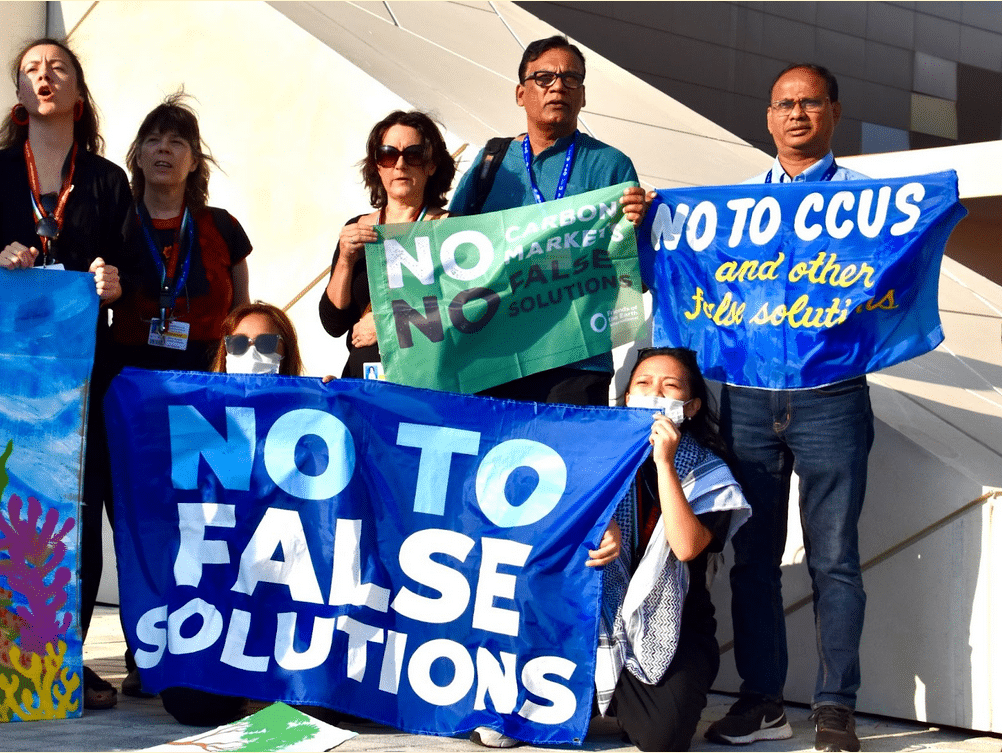Guest article by Ayumi Fukakusa, Deputy Executive Director of Friends of the Earth Japan
As the need to drastically cut emissions grows greater than ever, so too does the attention being placed on Carbon Capture and Storage (CCS)—by those who want to keep polluting. Japanese companies and the Japanese government, especially the Ministry of Economy, Trade and Industry, are chief among these. The Japanese parliament is currently discussing the CCS Business Bill, which will set a legal framework for CCS projects and could lead to CO2 captured from Japanese industries being dumped in other countries.
Meanwhile, Japanese corporations are already recklessly pushing CCS projects in the region and signing agreements for CO2 export with oil and gas giants such as Petronas and ExxonMobil. As of April 2024, at least 15 agreements have been signed by Japanese government entities and corporations to explore the feasibility of exporting CO₂ to be stored in Indonesia, Malaysia, Australia, and other unspecified countries in the region.
The Japanese government is promoting CCS to capture CO2 in industrial sectors where emissions are considered to be unavoidable. However, installing CCS in power plants is also expected as part of the government’s plan, even though there are viable alternatives in the energy sector. The government has set a goal of storing 120-240 million tons of CO₂ by 2050, which is equivalent to approximately 10-20% of Japan’s current emissions. In 2023, the Japanese Organization for Metals and Energy Security selected seven priority CCS projects, two of which are based on the assumption that the captured CO₂ would be exported overseas.
Although CCS was originally intended to be commercially-viable in Japan by 2020, there are still no commercial-scale CCS operations in the country. The Japanese government considers Japan to have limited CO2 storage potential on land, and ocean storage is more costly, which has led to plans that are currently underway to transport CO2 overseas, where it could be stored at a lower cost. A liquefied CO2 carrier is also already under development with government support but is still in the experimental stage.
The Japanese government has long provided policy support for CCS. In 2021 it launched the Asian Energy Transition Initiative (AETI) for “realistic energy transitions” in Asia. This included $10 billion in financial support for several sectors such as renewable energy, energy conservation, and CCUS projects. The current Kishida administration has also been promoting the Green Transformation (GX) Strategy since 2022, which includes plans to invest $26 billion over the next 10 years in CCS projects through “GX transition bonds.”
Criticism over Japan’s CCS policy is growing. In March 2024, Sahabat Alam Malaysia (Friends of the Earth Malaysia) and Friends of the Earth Japan submitted an open letter to the governments of Japan and Malaysia demanding that CCS isn’t promoted, as the technology only delays real climate action, and asserting that exporting CO2 from the Global North to the South would be a grave climate injustice. And in May 2024, 90 groups from 26 countries signed a petition voicing their opposition to Japan’s CCS policy, particularly exporting CO₂ to other countries.
Meenakshi Raman, President of Sahabat Alam Malaysia, said “The climate crisis we are in now is the consequence of historically high carbon emissions of developed countries such as Japan. For the world to even have a remote chance of meeting the 1.5 degree Celsius target, developed countries must take the lead in rapidly phasing out fossil fuels. This push for CCS by the Japanese government is just another smokescreen for them to continue fossil fuel exploitation. To make matters worse, instead of taking in the carbon produced by Japanese industries on Japanese soil, it seeks to dump the burden of storing carbon in a developing country such as Malaysia. We demand that the Japanese put a stop to this ugly manifestation of waste colonialism through the dumping of carbon in developing countries like Malaysia, and we call upon the Government of Malaysia not to let the country be the carbon waste bin of the developed world.”
Japan’s major polluters are actively seeking to create an unjust CO₂ trading scheme in the region, but civil society is organising to ensure that the Japanese government’s CCS policy remains a pipe dream. Instead they must set stronger emissions reduction targets, based on the principles of equity and recognising Japan’s historical responsibilities, and stop promoting these false solutions.




